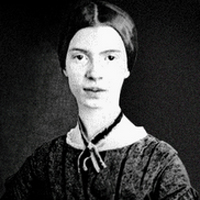Of Bronze-and Blaze by Emily Dickinson: Summary and Analysis
This is one of the finest, but strangely, the most neglected of Emily Dickinson's poems. This mystic poem deals with the old familiar poetic subjects--man and his relation to God and Nature. The splendor of Nature is an expression of the infinite glory and grandeur of God's creation. Man, the observer of Nature, assuming "vaster attitudes", may strut and fret his hour and then disappear from the scene.

Emily Dickinson (1830-1886)
The mortality of man, contrasted with the immortality of God and creative grandeur prevents him from assuming divine attributes for long. The poem is divided into three neat sections: the first section deals with the splendor of Nature, while the second treats man's ephemeral achievements and certain immortality. The final section juxtaposes man's immortality with the eternity of God and his creation, Nature.
The first section of the poem consisting of the first seven lines presents a splendorous scene of nature during the fall in Amherst. The solemnity and grandeur of the scene reflect the Divine Nature. The opening line of the poem has a dramatic impact showing the color and form of the northern lights seen in Amherst. 'Bronze' designates the striking blend of red and gold seen against the black night, while `blaze' connotes jagged, flaming peaks streaking across the sky. The 'alarms' connote the trivial concerns and insignificant problems of mundane life. The grandeur and isolation of God-head reflected in Nature is indifferent to the problems of the earthly existence.
The second section consisting of the next six lines dilates upon the philosophical considerations and contrasts man's temporary achievements and mortality with the vastness and the glory of eternity. The first person in the poem stands as much for Emily Dickinson as for the universal human spirit. The spirit of man is filled with aspirations and assumes vaster and magnified attitudes and struts proudly in its narrow world. In the words of Pickard, "The ironic undertones in the word 'strut', the suggestion of the flower's minute size in 'stem' and its ephemeral beauty indicates the hopelessness of man's attempts to assume divine attributes." The proud strutting of the human mind brings arrogance and hatred for those who have not perceived this temporary glory. Pickard enlarges upon this idea and observes it can even cause tragic pride, for under its influence man might try to exist without necessary oxygen and perish. Though the moment of ecstasy affords the soul a temporary mystic experience, the overall mood is ironic, underlining the pathetic insufficiency of any attempt to copy the Divine,'
In the final section consisting of the last six lines, the temporary human achievements, Pride and arrogance are seen in the perspective of their short-lived glory and man's mortality beautifully contrasted with the eternity of Nature and the Divine. The achievements of man are no more than like the collection of wild and bizarre animals in a menagerie. The word "their" refers to the northern lights and brings us back to the glory of Nature and grandeur of God. This is not a Menagerie, while man's world is, and will not fade out as man's show does. It is unique and eternal and lives on and on.
The human glory fades out and man's body will be mixed with dust in an unknown mound in an obscure place filled with grass. Beetles crawling about the grave are the only companions of man under the mound. The image of Beetles, shocking as it is, aptly suggests the mortality and failure of human aspirations. Man, inspired by the handiwork of God may attempt some immature imitation of the Divine. Ultimately, man fails and Nature and God endure. The distance between man and God persists.
Cite this Page!
Shrestha, Roma. "Of Bronze-and Blaze by Emily Dickinson: Summary and Analysis." BachelorandMaster, 8 Jan. 2018, bachelorandmaster.com/britishandamericanpoetry/of-bronze-and-blaze-summary-analysis.html.
Related Topics
Much Madness is Divinest Sense: Analysis
Renunciation: Summary and Analysis
Because I could not Stop for Death: Analysis
I Heard a Fly Buzz: Summary and Analysis
After Great Pain, a Formal Feeling Comes: Analysis
Success is Counted Sweetest: Summary and Analysis
I taste a liquor never brewed: Summary and Analysis
A Bird came down the Walk: Summary and Analysis
Hope is the Thing with Feathers: Analysis
I like to see it lap the Miles: Summary and Analysis
I had something that I called mine: Analysis
If I should Die: Summary and Analysis
I'm Nobody! Who are you?: Summary and Analysis
These are the days when the Birds come back
What Inn is this: Summary and Analysis
Exultation is the going: Summary and Analysis
A Clock Stopped: Summary and Analysis
I felt a Funeral, in my Brain: Summary and Analysis
Safe in their Alabaster Chambers: Analysis
There's a certain Slant of light: Summary and Analysis
To fight aloud, is very brave: Summary and Analysis
I like a look of Agony: Summary and Analysis
Bring me the sunset in a cup: Summary and Analysis
The day came slow-till Five o'clock: Analysis
 |
bachelorandmaster.com |